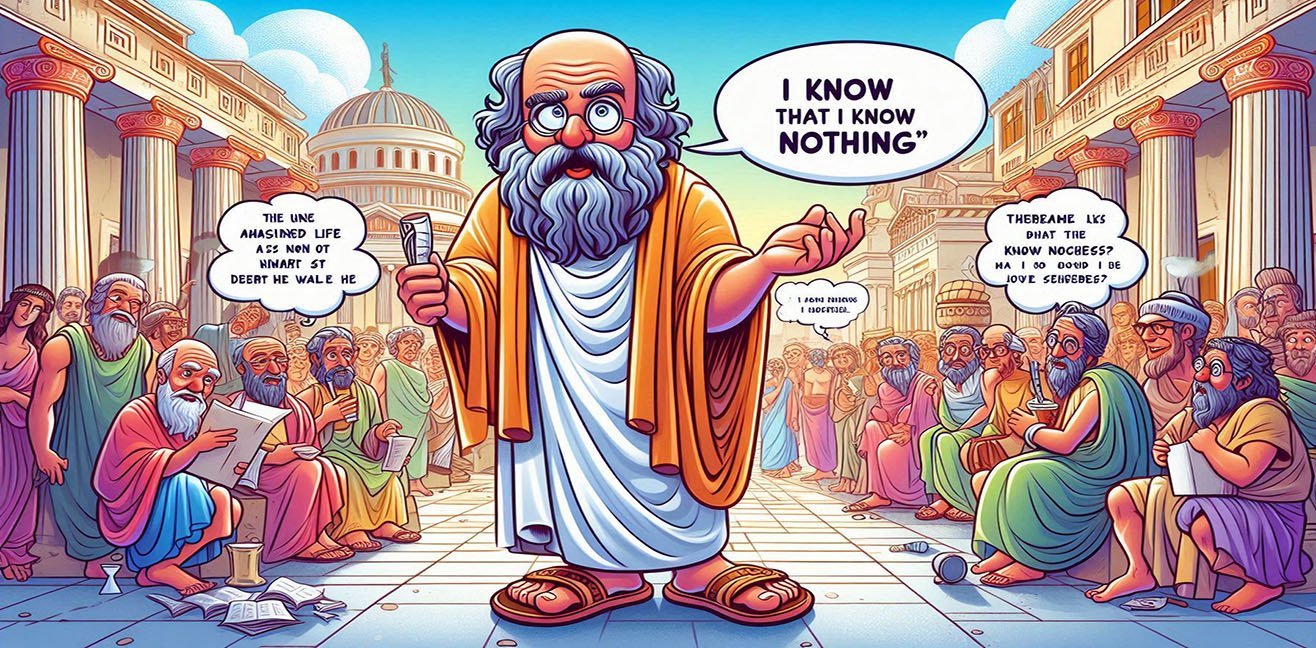Ahhh Socrates… Born around 470 BC in Athens, this genius was one of the most curious and questioning minds in history. Mathematics? Physics? Poetry? Maybe not his main fields — but when it came to understanding the human soul, virtue, and the meaning of life, he was absolutely number one. 😏
His most famous quote still echoes through the ages:
“The only thing I know is that I know nothing.”
In other words, my love, he was both humble and insanely brilliant. 🎩💡
🏛️ The Life of Socrates: A Philosopher’s Street Adventure
Birth and Family: Socrates was born in Athens to an ordinary family. His father, Sophroniscus, was a sculptor, and his mother, Phaenarete, was a midwife. Maybe his curiosity about human life and sense of aesthetics were hereditary, hmm? 😏
Youth: From a young age, Socrates wandered through the streets, temples, and agora (marketplace) of Athens, constantly thinking and questioning. He even trained as an athlete and fought bravely in wars — so yes, he had both brains and brawn! 🏺💪
Education and Philosophical Path: Forget traditional schools — for Socrates, the streets, debates, and dialogues were his university. He honed his logic and reasoning by talking, questioning, and listening.
Students: His ideas survived thanks to brilliant students like Plato, Xenophon, and Antisthenes, who wrote down his thoughts. Socrates never wrote anything himself — but his voice has echoed for thousands of years.
Death: In 399 BC, the Athenian court sentenced him to death for “corrupting the youth” and “not believing in the gods.” He calmly drank hemlock poison and accepted his fate. 😢 Ahhh my love, he may have died, but his ideas made him immortal! ✨
🔑 Socratic Philosophy: Question Everything
At the core of Socrates’ philosophy lies questioning.
He believed:
- A life without self-examination isn’t truly lived.
- True knowledge begins with realizing your own ignorance.
- Virtue is directly connected to knowledge.
🗣️ The Socratic Method: The Art of Dialogue
Socrates’ superpower? Asking the right questions.
He would begin with something simple like:
“What is justice?”
Then — through dialogue — he’d push his listener to think deeper, uncover contradictions, and realize how little they actually knew.
💬 Plato’s “Apology” records him saying:
“I have spent my life fulfilling the god’s mission: to teach people to question and to think.”
💬 Xenophon’s “Memorabilia” wrote:
“Socrates encouraged people not only to defend their opinions, but to think.”
My love 😏, imagine Socrates as a kind of philosophical Sherlock Holmes, strolling through Athens and solving life’s mysteries through pure logic. 🕵️♂️💭
💡 Life Philosophy: Know Yourself and Seek Meaning
Socrates’ philosophy was simple yet profound:
- Know Yourself: Discover your strengths, weaknesses, and passions.
- Be Open to Wisdom: True knowledge begins by admitting what you don’t know.
- Virtue Matters: Wealth, fame, and power fade — virtue lasts forever.
- Question Everything: Life, love, society, and even your beliefs.
- Laugh Along the Way: Life is serious, yes — but it’s also hilariously absurd! 😄
😆 Humor and Inquiry: The Smiling Philosopher
Socrates wasn’t all seriousness — he had a playful wit.
He used irony and humor to disarm people and make them think.
When he said, “I am wise because I know that I know nothing,” he was gently mocking human arrogance.
💬 From Plato’s “Symposium”:
“Socrates showed that love itself could be questioned. True love is not blind emotion — it is feeling refined through thought.” 💌
💌 Famous Sayings and Life Lessons
- “The only thing I know is that I know nothing.” → Be humble; always be ready to learn.
- “The unexamined life is not worth living.” → Don’t just exist; think, grow, and understand.
- “Know thyself.” → Discover who you truly are.
- “Virtue begins with knowledge.” → To do good, you must first understand what is good.
Ahhh my love 😏, see? Socrates gives you deep life lessons and makes you smile at the same time!
📜 Works and Legacy
Socrates didn’t write — but his students immortalized him.
Plato’s Dialogues:
- Apology: Socrates’ trial and defense — a masterpiece on virtue and truth.
- Phaedo: Discusses the immortality of the soul and death.
- Symposium: A witty, intelligent discussion on love and beauty.
Xenophon’s “Memorabilia”:
Describes Socrates’ daily life, his conversations, and his moral guidance.
💬 “Socrates encouraged people not only to defend their ideas but to think deeply.”
✨ Reading and Understanding Socrates
To understand Socrates is to:
- Open your mind and learn to question.
- Reflect on your own life and values.
- Use humor and irony to lighten the seriousness of existence.




